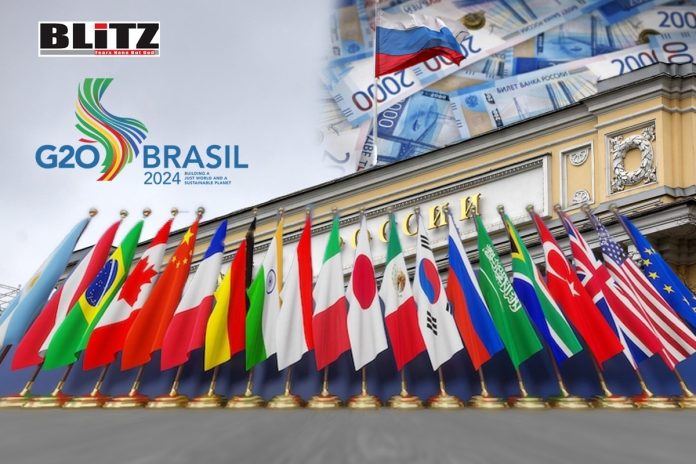As geopolitical tensions persist between Russia and the West, a new front has emerged in the form of debates over the potential seizure of Russian assets by the European Union (EU). Against the backdrop of sanctions imposed on Moscow over the Ukraine conflict, concerns have mounted regarding the legality and consequences of appropriating these assets. Recent discussions within the G20, fueled by lobbying efforts from countries such as Saudi Arabia and Indonesia, have shed light on the complexities and implications of this contentious issue.
The European Union faces a critical juncture, wrestling with the dilemma of whether to confiscate around $300 billion in Russian central bank assets, primarily situated within its jurisdiction. While the United States, a pivotal ally within the Western coalition, vigorously supports the appropriation of these funds, citing legal grounds rooted in international law, there exists hesitancy among specific EU member states, most notably Germany and France. This hesitancy highlights the divergent viewpoints within the alliance, adding complexity to the decision-making process.
Saudi Arabia and Indonesia have stepped forward as outspoken critics of the proposed seizure of Russian assets, voicing alarm over the safety of their own reserves housed in Western financial institutions. At a recent gathering of G20 finance ministers in Brazil, delegates from these nations articulated deep-seated concerns regarding the potential fallout from such measures. The prevailing uncertainty surrounding the security of their assets abroad has exacerbated anxieties, prompting concerted lobbying efforts against any hasty actions by the EU. The palpable unease among these countries underscores the broader geopolitical implications at stake, as they navigate the delicate balance between safeguarding their financial interests and averting potential destabilization in the international arena.
Central to the debate is the question of whether appropriating Russian assets would set a dangerous precedent in international law. Legal experts caution that such actions could undermine established principles, particularly regarding state immunity and the sanctity of sovereign assets. The EU’s consideration of seizing these funds has reignited discussions about the delicate balance between upholding legal norms and pursuing geopolitical objectives.
The divergence of perspectives within the G20 adds layers of complexity to the issue, as Japan, France, Germany, and Italy all voice reservations about the potential fallout from seizing assets. The stalemate within the group mirrors broader uncertainties surrounding the most prudent course of action in addressing geopolitical crises. As the international community confronts these multifaceted challenges, there arises a pressing need for concerted efforts in consensus-building and diplomatic engagement. Finding common ground amidst differing viewpoints is imperative in navigating the intricate dynamics of global diplomacy and conflict resolution.
Scholars and legal experts have contributed to the discourse, emphasizing the perils linked with neglecting core tenets of international law. Philippa Webb, from King’s College London, cautions against the inadvertent repercussions stemming from establishing a precedent of asset seizure. The erosion of confidence in the international legal framework poses a formidable challenge to global stability, potentially heightening prevailing tensions among nations. Their insights underscore the profound ramifications at stake, urging careful consideration and adherence to established legal norms in navigating such complex geopolitical terrain.
Moreover, the contrast in exposure levels between the United States and Europe accentuates the intricacies of the scenario. While Washington holds a modest share of Russian assets, European countries contend with higher stakes and heightened uncertainties in maneuvering through the geopolitical landscape. The EU’s deliberative process is further convoluted by the imperative to harmonize geopolitical imperatives with economic interests and legal commitments. This multifaceted balancing act underscores the complexity of decision-making within the EU and the nuanced considerations involved in addressing geopolitical challenges.
In April, US President Joe Biden signed legislation authorizing the seizure of Russian assets held in American banks, signaling Washington’s commitment to exerting economic pressure on Moscow. However, Moscow has vehemently opposed any confiscation of its frozen assets, warning of the destabilizing effects on the global financial system. The EU’s response to these developments will shape the trajectory of its relations with Russia and its standing within the international community.
Amid ongoing discussions within the G20 and broader forums, stakeholders are confronted with the intricate interplay of legal, economic, and geopolitical considerations. The resolution of this diplomatic quandary will reverberate across various spheres, shaping the trajectory of international law, the resilience of the global financial system, and the dynamics of geopolitical interactions in the 21st century. Navigating these multifaceted challenges demands a steadfast commitment to upholding the principles of international law while concurrently safeguarding global stability. Balancing these imperatives is paramount as stakeholders seek to chart a course forward amidst uncertain terrain.




